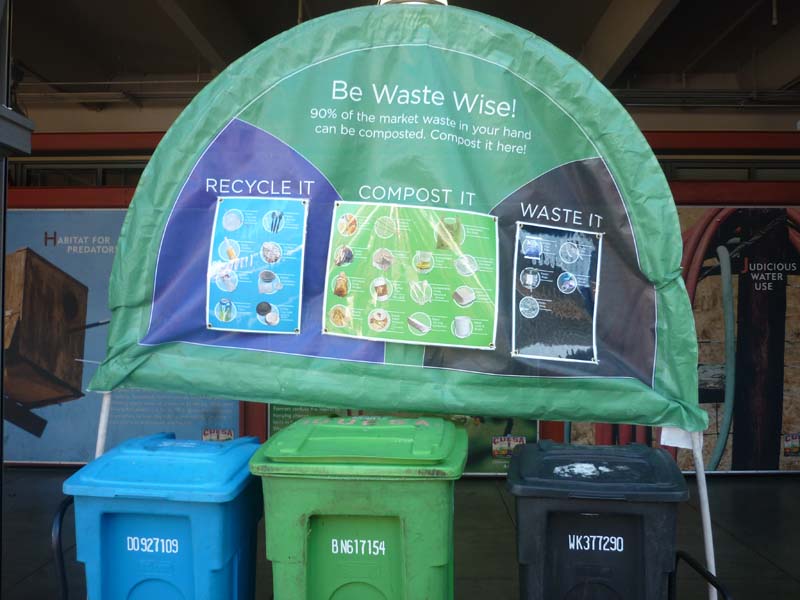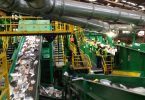If you thought bike sharing was going to be the definitive end of the world for New York’s old guard elite, wait till they get their fingers on Mayor Bloomberg’s plan to require food composting in NYC.
Mayor Michael R. Bloomberg, who has tried to curb soda consumption, ban smoking in parks and encourage bike riding, is taking on a new cause: requiring New Yorkers to separate their food scraps for composting.
Imagine the horror of having to put your yucky food waste in a separate bin rather than having your yucky food waste stick to the bottom of your trash can!

From San Francisco on Track to Become Zero Waste City, starring citisven — a San Francisco horror movie! Photo: Debra Baida
Granted, it’ll initially only be a voluntary program that would compost about 10 percent of the city’s residential food waste, but in a city as big as New York that will still account for 100,000 tons of food scraps per year.
However, as Mayor Bloomberg said in his most recent State of the City address, this is as much an economic issue as it is an environmental one.
“We bury 1.2 million tons of food waste in landfills every year at a cost of nearly $80 per ton,” he said. “That waste can be used as fertilizer or converted to energy at a much lower price. That’s good for the environment and for taxpayers.”
Imagine all the things NYC could do with the $336 million it spent just last last year exporting most of its trash to landfills in Ohio, Pennsylvania and South Carolina.

The bad news for all those freedom-loving patriots who prefer to throw their shit wherever the hell they please (because we all know that in the Land-of-the-Free you would never have any rules and laws that would regulate where you can toss your crap) is that this voluntary pilot program will most likely turn mandatory soon with the support of whoever will be Bloomberg’s successor after he leaves office at the end of this year.
Two leading Democratic candidates for mayor, Christine C. Quinn, the City Council speaker, and Public Advocate Bill de Blasio, expressed strong support for the program — including the plan to eventually make it mandatory.
According to Quinn, the New York City Council will take up a bill this summer to require pilot programs across the city to ensure that voluntary recycling of food waste continues, with a mandatory program in place by 2016, regardless of who is mayor.
“We’re going to lock it in,” she said. “When New York makes composting part of everyday life, every other city will follow through. This is going to create an urban trend.”
That’s right, it’s going to be an irreversible trend once residents of the Big Apple start throwing their rotten apples into compost bins. And us San Franciscans who’ve been composting for years are going to applaud New Yorkers’ “it’s only happening if it’s happening in New York” mentality just this one time, because when a trend is this good for the well-being of the entire planet it doesn’t matter who starts it.
But this issue goes far beyond trash, and New Yorkers are just beginning to learn about the deeper win-win-win situation of composting food waste that has been demonstrated by San Francisco’s zero waste efforts.
Here’s a segment on PBS News Hour that shows how San Francisco has managed to reach this important milestone thanks to its state-of-the-art residential and commercial composting programs and is on its way to zero waste by 2020. (At around 2:10 my sweetie and I get to demonstrate how easy it is to compost in our home)
[youtube http://www.youtube.com/watch?v=o5-tW0oh48w]As I’ve written before, urban composting solves a whole host of problems beyond keeping organic materials out of landfill and reducing methane emissions.
In the case of New York, some of residents’ food waste will be processed into biogas, which would be used to generate electricity.
Better yet, in San Francisco all 1.2 million tons of the city’s food scraps so far have been returned to local farms and residents. Used at more than 200 farms and vineyards throughout the Bay Area, SF compost is one of the most nutrient-rich soil amendments in the country due to its very diverse feed stock-rich food scraps.

San Francisco’s resource recovery company Recology hosting their annual compost giveaway where each resident gets 5 gallons of free gourmet planting soil made from their own food scraps.
Adding to this closing of the food and waste cycle is a little known but remarkable fact about urban compost: According to Fulbright Scholar and former Rodale Institute Research Director Paul Hepperly, applying food scrap compost to cover crops has the potential to offset 20 percent of America’s carbon emissions by adding carbon to the soil and taking it out of the atmosphere.

Vineyards in Northern California apply compost made from food scraps to grow cover crops such as mustard and beans. That stimulates microbial activity and helps turn farms into carbon sinks. Photo by Larry Strong, courtesy of Recology.
Consider that in 2010 less than 3% of food waste in the United States was composted, not only letting 97% of a valuable resource needlessly fill up our landfills and release methane into the atmosphere, but squandering a huge opportunity to use a simple natural food cycle to pull loads of carbon back into the ground. While it has become somewhat fashionable among environmentalists to belittle the global garbage crisis as nothing more than a boutique problem dwarfed by the much larger threat of rising sea levels, super freak storms, and devastating wildfires, more and more municipalities around the world are realizing that the disposable culture we have allowed to thrive in the last half century or so is intrinsically linked to the rise in greenhouse gases, and that zero waste is a key component in addressing climate change.
Thank you Mayor Bloomberg and people of New York for becoming part of the solution!
I’ll leave you with an excerpt from an article I wrote last year that explains why mandatory composting is necessary to get to zero waste, and how it turns out to be no different than “stashing your trash” once people start getting used to it.
Tossing your recyclables in a bin is one thing. Saving your sloppy seconds is another. Sure, you have your early adopters — your urban gardeners and other green-thumb types — but how do you get the bulk of your citizenry that was raised on garbage disposals and anti-bacterial soap to hang on to their avocado pits and sandwich wrappers? Composting, it seems, is as much a state of mind as it is a physical activity. It’s like eating something you’ve never had before; there’s a mental block that’s hard to overcome without a little help. And yet, once we’ve taken that first bite, we quickly forget how much we used to not like what we didn’t know.
The city knew that if it wanted to have a large-scale, city-wide composting program to make an actual dent in the overall waste stream, it would have to be mandatory. Its pilot program had shown that not only food scraps but yard trimmings, coffee cups, greasy pizza boxes and even milk and juice cartons could be broken down at Jepson Prairie Organics, a compost facility about 55 miles east of San Francisco in Vacaville. From there, the nutrient-rich organic fertilizer — perfect for reconditioning soil due to its diverse feedstock — could be distributed to surrounding farms, which in turn sell their produce to SF residents and restaurants, thus closing the loop locally.
After the board of supervisors passed the Mandatory Recycling and Composting Ordinance in 2009, people quickly adapted to the new green carts. According to the San Francisco Department of the Environment, hundreds of thousands of residents and over 5,000 restaurants and other businesses now send over 600 tons of food scraps and other compostable material each day to Jepson Prairie.
o~O~o~O~o~O~o~O~o~O~o~
crossposted at Daily Kos









Hooray for Mayor Bloomberg. For a rich business man type and politician he seems to get it and may actually “care” about for society and the larger picture. I’m sensing since the East Coast has been rocked by some exceptional hurricanes over the last couple of years that climate change is something they are taking more seriously. Hello, you live on a little spit of rock right next to the Atlantic Ocean!
You’re right, Al, I think for a super-rich guy Bloomberg is quite tuned in to what’s going on in the world. I’m not sure if it’s all going to be enough to deal with the effects of climate change, especially since it seems like most of the Jersey shore towns are rebuilding everything in the same place post-Sandy. I guess it’s the power of familiarity that makes people want to do the same thing and stay in the same place even though it would be much smarter to rethink the entire city layout after a catastrophe like that and rebuild on higher ground.